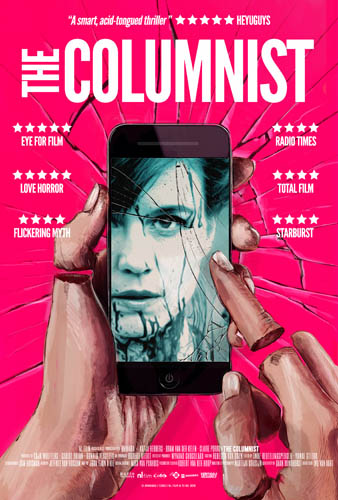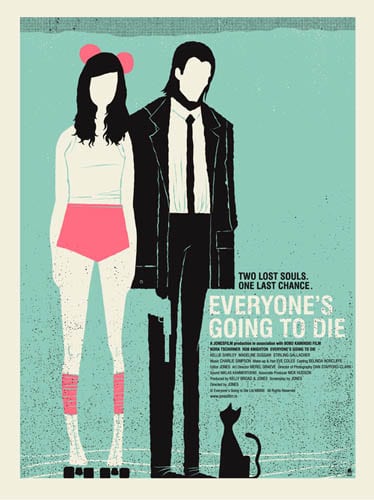The Columnist (2019)
Directed by: Ivo van Aart
Written by: Daan Windhorst
Starring: Bram van der Kelen, Katja Herbers

THE COLUMNIST
Directed by Ivo van Aart
As much as I love our dear readers, I feel a bit of anxiety on the rare occasions an email comes in saying someone has commented on one of my reviews. To be fair, they’re rarely negative – I think I’ve had more asking for my phone number than I have folks telling me off. Still, there’s something about online comments sections that seem to bring out the worst in people. It could be the digital anonymity transforming a real-life coward into a keyboard warrior, or it could be how impersonal it seems. Regardless, it makes you wonder if they’d be as hard in real life. So goes the premise of Dutch director Ivo van Aart’s black comedy.
Every day, columnist and author Femke (Herbers) is flooded with anonymous nasty messages and death threats on social media: a never-ending barrage of people who hate her, seemingly lust after her or both. With a novel that’s going nowhere, a deadline hanging over her head, a very unsympathetic editor and now people doing constant building work outside her house, it’s all getting too much. Most people don’t see the big deal – a sales assistant says if she didn’t want the hassle, she wouldn’t go on TV, and rival turned boyfriend Steven (van der Kelen) intentionally courts this sort of vitriol for sales. The police are similarly dismissive – “it’s just the Internet. It’s not real”. One day, she’s had enough. Words can hurt, and so can she. Taking a finger trophy from each person, presumably representing the hands they use to tweet their bile at her, she sets out to silence her trolls.

It’s an interesting, not to mention a timely premise told well. There are also good turns in the plot – I wouldn’t go as far as calling them twists, but they kept me on my toes. Particularly a smart subplot involving Femke’s daughter getting paranoid. Plus, some excellent visual touches too. A scene where Femke tries to do shopping, but the screen is overwhelmed by violent, misogynistic posts does a great job putting us into her headspace – illustrating how overwhelming it can be having a daily Twitter pile-on to contend with. The matter-of-fact way the kills are presented is well-judged, too: blunt, but never enough bloodshed that we feel too bad for anyone. The audience has to feel more for her than the people she kills since the piece’s success rests on us vicariously getting our own back on social media through her. So it helps that the victims aren’t hugely likeable. However, it’s a nice touch that we’re reminded they have families and friends offline – gradually warming us to the idea this may not be as much fun as it first seems.

The love story between Femke and Steven is also well-handled. For a start, we get the odd touching scene: her smiling as she finds an extra tube of toothpaste by her sink. Steven bonding with her kid too. It’s interesting how different people’s assumptions about them are, too, because of how they look and how they handle the relentless criticism. Being a professional provocateur, he can switch off: divorcing his online persona from his real-world one. As a woman who writes from her own perspective, covering safe topics like the joys of a soft-boiled egg, she can’t. There’s an interesting paradox in Femke championing free speech at her daughter’s school, celebrating her right to say whatever she wants, whilst essentially engaging in the ultimate act of censorship. It’s a contradiction the narrative doesn’t shy away from. Still, it doesn’t compromise how much we like her, even when her actions become less excusable.

On that point, what really impressed me is how the form underlines the meaning, with Femke’s killing matching the trolling in that is starts as a joke before getting darker and darker. We agree with her that everyone should be nicer, but we’re implicated in the violent things she does to spread this message. It’s a challenging film, that explores paradoxes about free speech and the limits of public discourse: albeit in a shallow way. By showing both the pain of people on the receiving end of shitposter obscenity and making a principled argument in favour of their right to do it, it doesn’t find easy answers either. Speaking of which, how Femke can track people down is alluded to in passing, and it feels like the already shortish film is skimming over another potentially interesting topic: how little privacy we give ourselves online. The ending also seemed a little too in your face – a highly gifable moment that nonetheless seemed to go from sharp satire to something broader. Minor issues like this aside, though, you won’t see me say a bad word about it. Especially not to the people involved. Incidentally, for a spot of art imitating life be sure to look up the original title that was vetoed here.
The Columnist will be released in the UK and Ireland in cinemas as well as Digital HD format from 12th March







Be the first to comment